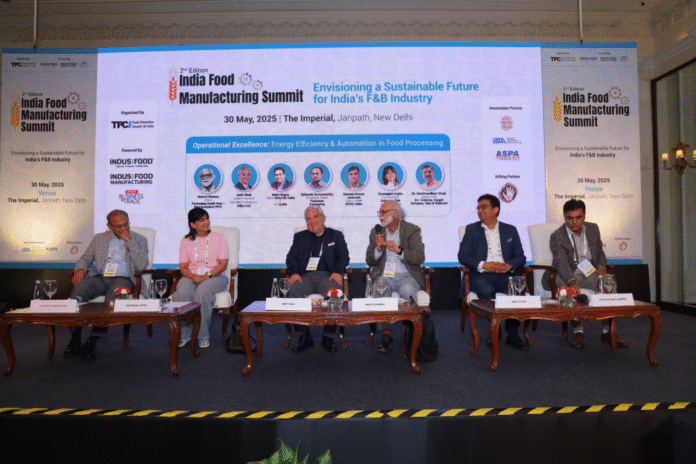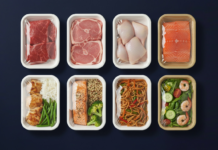
The India Food Manufacturing Summit 2025, held on 30 May 2025 in New Delhi, brought together leading voices from the food and beverage (F&B) sector to discuss how India’s manufacturing landscape can evolve to meet future demands. Organized by the Trade Promotion Council of India, the summit was powered by Indusfood, Indusfood Manufacturing and India Business & Trade, and centered on ‘Driving a sustainable future for the Indian F&B industry’.
The summit was inaugurated by Devesh Deval, joint secretary, ministry of food processing industries, who highlighted the need for long-term thinking and collaborative efforts to position India as a key player in global food processing. He spoke about aligning industry goals with national priorities, increasing private sector participation, and fostering innovation across the value chain.
Delivering his keynote address, Deval remarked, “The past few decades have seen amazing growth in food production. However, the next significant challenge is food availability — how to minimize losses, increase nutrient value, improve shelf life, and adopt sustainable practices, among others. These are the challenges for the food processing sector. So, how do we harness innovation and technology to produce and deliver at scale? That is the key question before all of us.”

Monica Gaur, director, department of commerce, government of India, and co-panelist for the inaugural session, stated, “The food and beverage industry occupies a critical part in India’s agri value chain. It acts as a vital bridge connecting farmers to consumers, both domestically and globally. Growth in this industry must go hand in hand with sustainability in processing, sourcing, and waste management. Collaboration is the key to achieving this objective.”
Delivering the welcome address, Mohit Singla, chairman, Trade Promotion Council of India (TPCI), underlined the transformative role of technology in the future of food processing. “With one of the world’s largest agricultural bases and a growing appetite for innovation, we are poised for global leadership. But the real question is—how do we get there? And the answer, in a word, would arguably be technology. We now have a golden opportunity to leapfrog legacy systems and build a future-ready, tech-enabled food ecosystem.”
Singla said smart manufacturing, AI, advanced cold chains, and intelligent packaging would be central to achieving export-grade quality, sustainability, and consumer trust. He emphasized that India must move beyond being a supplier of raw materials to becoming a global hub of processed food excellence, urging strong collaborations across the industry, government, academia, and startups.
Sustainability, automation, preservation, packaging
The event featured a host of panel discussions on sustainability, the need for automation, preservation of food and safe and green ways of packaging.
The first panel discussed ‘Sustainability: Urgent need, practical solutions.’ From managing water usage and carbon emissions to tackling waste, the discussion revolved around how companies can integrate environmentally responsible practices into their core operations. The panelists shared examples of circular economy models and ongoing government initiatives, calling for scalable solutions that balance profit with environmental impact.
The panelists in the session moderated by Gurinder Singh, director marketing, Rance FPS, included Ashish Agarwal, MD, Bhikharam Chandmal; Kuldeep Sharma, chief think officer, Suruchi Dairy Advisors; Kajal Debnath, chief regulatory officer, DFM Foods; Kalpam Chauhan, SRA, Mother Dairy Kshitija Vishal Kale, R&D, Pravin Masalewale (Suhana); and Shailendra Singh, Founder & CEO, SustainMantra.
The second panel, titled ‘Automation and energy efficiency take centre stage,’ focused on how smart factory technologies—AI, IoT, and robotics—are helping manufacturers reduce costs and improve productivity. The conversation touched upon infrastructure upgrades and workforce readiness, stressing that digital transformation is now key to staying competitive in the F&B sector.
The panelists included Ashwani Setia, CEO, Thermodyne Engineering; Kapil Kapoor, founder-CTO, Vayuguard Climate Tech; Akanksha Ghai, Co-founder, BVeg Foods; Radhey Shyam Dixit, founder & Chairman, Ananda Group; Subhasis Das, business head, Forbes Marshall. The session was moderated by Sagar Kurade, MD, Suman Food Consultants.
The third session was titled ‘Innovation in preservation: Retort and IQF in focus.’ With a growing emphasis on safety, traceability, and sustainability, the experts spoke about innovations such as intelligent labeling, biodegradable materials, and tamper-evident designs. The third session underscored how packaging is no longer just functional but is also a strategic component in building consumer trust and reducing environmental footprint.
Moderated by Vinod Kaul, CEO, Mariental IndiaPanelists, the experts included, Bhavana Vishwanath, Director & CEO, Kiremko India; Seema Atreya, CEO, Kanha Group; Deepta Gupta, MD, Indiyum Foods; Sagar Kurade, MD, Suman Food Consultants; Sushil Sharma, business head, Sealed Air; and Shailesh Khatavkar, Manager Sales – IN, SL, BD, JBT Marel.
The industry leaders explored how technologies such as retort processing and individual quick freezing (IQF) are extending product shelf-life while maintaining quality. These advancements are opening new export opportunities, especially in the ready-to-eat and frozen food segments.
In the last discussion, ‘Smarter, safer, greener packaging,’ Naresh Khanna, editor, Packaging South Asia & vice-president, IPPO, was the moderator.
The panel spotlighted the next frontiers in packaging and labeling—smart, safe, and sustainable solutions. Experts from packaging technology, regulatory bodies, and leading F&B companies discussed innovations such as intelligent labeling, biodegradable materials, and tamper-evident designs. The session addressed evolving consumer expectations, compliance requirements, and the shift toward eco-friendly materials. Participants learnt how packaging can enhance brand trust, product traceability, and environmental impact.
The experts included Amit Shah, joint president, Uflex; Ankit Gupta, joint managing director, Holostik India; Srikanth Ramamurthy, business head, Parksons Packaging; Naveen Kumar Janmeda, sales head, KURZ India; Geetanjali Gupta, co-founder, Gabletop Pak & Kevala Neru; and Harshvardhan Singh, consultant (Ex-Cremica, Cargill, Reliance, Tata & Walmart).
A step forward for India’s F&B future
The India Food Manufacturing Summit 2025 emerged as a vital platform for fostering meaningful dialogue, cross-sector collaboration, and actionable insights. As India’s F&B manufacturing sector gears up for accelerated growth, the deliberations underscore the critical need to embed sustainability into the DNA of operations, harness the power of advanced technologies, and remain agile in meeting evolving consumer demands.
The overarching message was clear and compelling – India is well-positioned to become a global powerhouse in food manufacturing. But achieving this vision will require unwavering commitment to innovation, strategic partnerships across the public and private sectors, and a shared resolve to build a resilient, future-ready food ecosystem.
Following next is the 5th edition of Indusfood Manufacturing, a one-stop supplier exhibition for the F&B industry, which will be organized in Yashobhoomi, Dwarka, New Delhi, from 6 to 8 January 2026.
As a key platform for food processing, packaging, ingredients, and hospitality equipment, this event will bring together global technology suppliers, industry leaders, and innovators to showcase cutting-edge solutions. With India’s food processing sector evolving rapidly, Indusfood Manufacturing 2026 will play a crucial role in shaping the future of food technology and fostering industry collaborations.
IndiFoodBev — authentic, impactful and influential
An English-language food and beverage processing and packaging industry B2B platform in print and web, IndiFoodBev is in its third year of publication. It is said that the Indian food and beverage industries represent approximately US$ 900 billion in revenues which implies more than 20% of the country’s GDP. Eliminating the wastage on the farmside can help to deliver more protein to a higher number of the population apart from generating sizable exports. The savings in soil, seeds, water, fertilizer, energy and ultimately food and nutrition could be the most immense contribution that country is poised to make to the moderation of climate change.
To improve your marketing and grow sales to the food and beverage processing and packaging industry, talk to us. Our research and consulting company IppStar [www.ippstar.org] can assess your potential and addressable markets in light of the competition. We can discuss marketing, communication, and sales strategies for market entry and growth.
Suppliers and service providers with a strategy and budget for targeted marketing can discuss using our hybrid print, web, video, and social media channels to create brand recognition linked to market relevance. Our technical writers are ready to meet you and your customers for content.
The second largest producer of fruit and vegetables in the world is continuously expanding processing capacities and delivery systems with appropriate innovative technologies. We cover product and consumer trends, nutrition, processing, research, equipment and packaging from farm to thali. Get our 2025 media kit and recalibrate your role in this dynamic market. Enhance your visibility and relevance to existing markets and turn potential customers into conversations. Ask for a sample copy of our bi-monthly in print or our weekly IndiFoodBev eZine each Wednesday.
For editorial info@ippgroup.in — for advertisement ads1@ippgroup.in and for subscriptions subscription@ippgroup.in
Naresh Khanna – 10 February 2025
Subscribe Now










